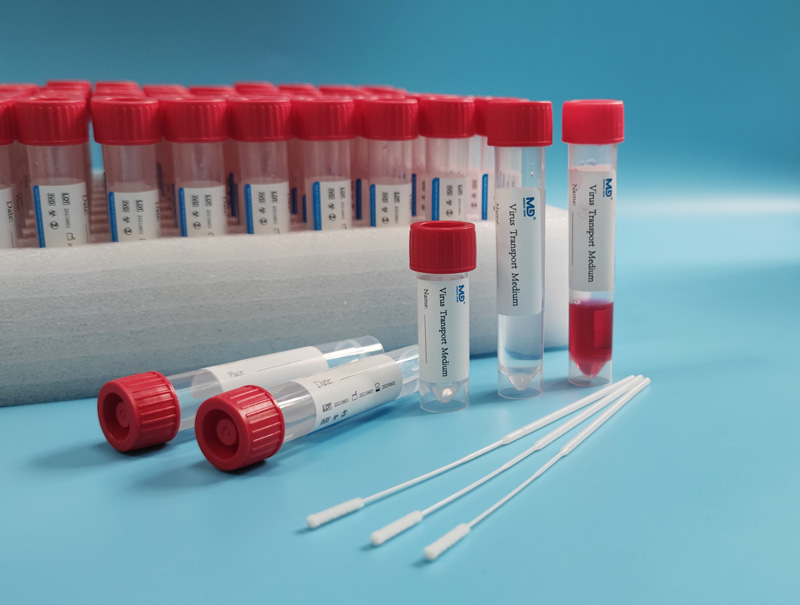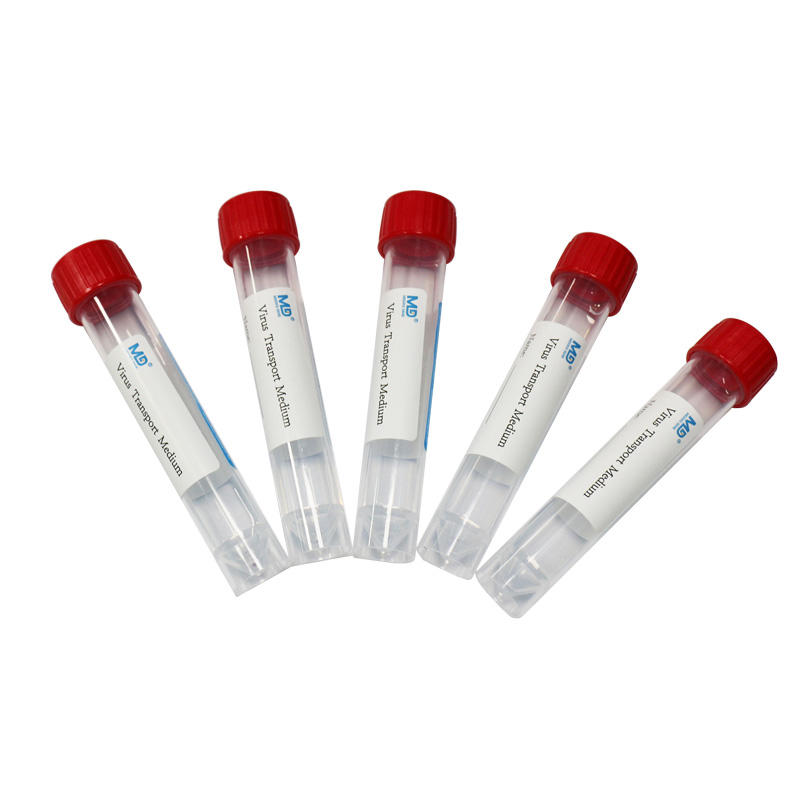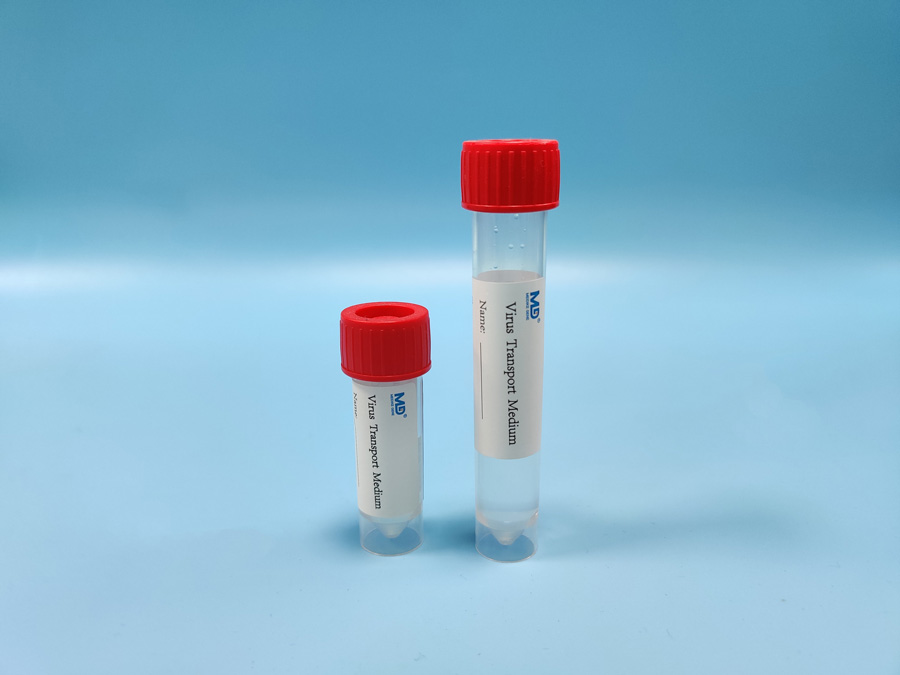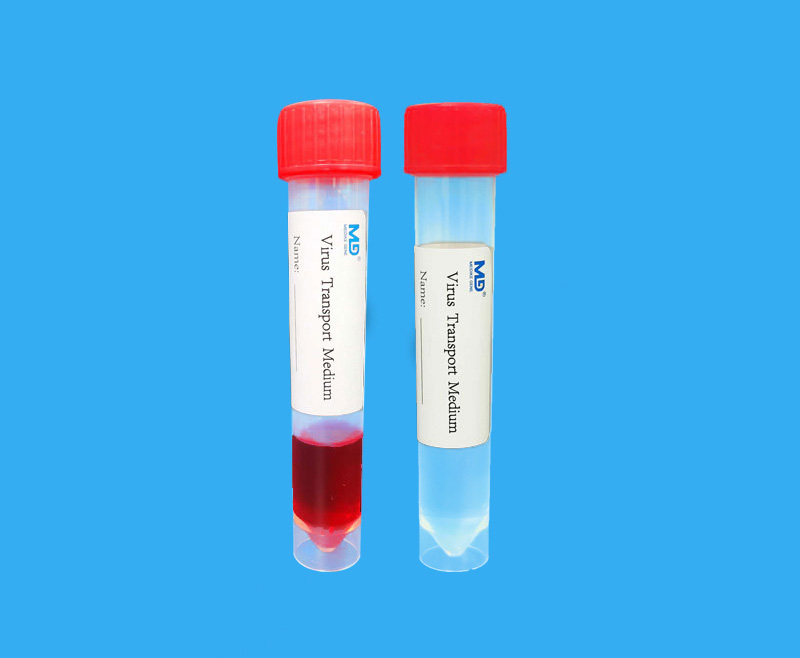
Maintenant, La forme de prévention et de contrôle du nouveau coronavirus est encore très sévère. Comme la première étape de la détection de l'acide nucléique, L'importance de la collecte et de la préservation des échantillons est incontestable. L'industrie d'inspection dit souvent “déchets, déchets” est important. Le premier facteur d'influence est la collecte d'échantillons. S'il y a un problème avec la collection d'échantillons, Peu importe à quel point le travail ultérieur est effectué, le résultat sera invalide. Le choix de la bonne solution de préservation du virus et du tube de collecte peut rendre la nouvelle détection de la couronne plus efficace
Presque tous les liquides de préservation de virus sur le marché préservent directement les virus vivants, causant le personnel médical dans l'échantillonnage, le transport et les tests pour faire face à un risque plus élevé d'infection. En réponse à cette situation, la ligne de front des anti-épidémies a besoin d'échantillons capables d'inactiver directement le virus. Solution de conservation, mais il faut noter qu'en inactivant le virus, il doit également examiner si la solution de conservation peut préserver de manière stable l'intégrité de l'acide nucléique viral, de manière à éviter la dégradation de l'acide nucléique dans l'échantillon avant le test, résultant en un “faux négatif” test d'acide nucléique. Shenzhen Medico ne contient pas de solution de préservation du virus du sel de guanidine pour minimiser le risque de “faux négatifs”.
Nous avons comparé les effets de la solution de préservation contenant du chlorhydrate de guanidine et de l'isothiocyanate de guanidine sur le marché avec la solution de préservation de Shenzhen Medico sans sel de guanidine dans la préservation du coronavirus de volaille à 37 ° C. Il s'avère que l'ingrédient principal est la solution de préservation du sel de guanidine, et l'effet de préservation est très insatisfaisant.
Les mêmes conditions sont 37 ° C. Après le stockage pour 1-7 jours, L'efficacité de préservation de l'acide nucléique viral est fondamentalement constante à 100% Lorsque vous utilisez une solution de préservation de Shenzhen Medico; tandis que l'efficacité de préservation de l'acide nucléique viral est progressivement réduite lorsque les deux autres composantes de sel de guanidine sont utilisées. , Au 7ème jour, C'était déjà moins que 20%, indiquant que l'ARN se dégrade violemment au fil du temps
Sel de guanidine (isothiocyanate de guanidine ou chlorhydrate de guanidine, etc.), comme dénaturant protéique classique, est souvent utilisé pour la lyse cellulaire dans l'extraction d'acide nucléique, et peut également obtenir l'effet d'inactiver les virus, mais le composant sel de guanidine n'a pas la capacité de fonctionner dans des conditions de température normales. La capacité de préserver l'acide nucléique viral est très facile à provoquer la dégradation de l'échantillon, il ne convient donc pas à la conservation de nouveaux échantillons de coronavirus, il est donc fortement recommandé de choisir une solution de préservation de virus qui ne contient pas de sels de guanidine.
Ici, nous faisons appel à la majorité des travailleurs médicaux, si votre objectif d'échantillonnage est de tester les acides nucléiques et que vous n'avez pas besoin de cultiver des virus vivants, alors vous devez faire attention aux aspects suivants lors du choix d'une solution de préservation de virus:
• Utilisez une solution de conservation qui peut inactiver le virus
La détection actuelle des acides nucléiques consiste à détecter l'ARN viral dans l'échantillon, et le virus doit être lysé. Par conséquent, tant que l'intégrité et la stabilité de l'acide nucléique viral peuvent être assurées, il n'est pas nécessaire de préserver le virus vivant. Par conséquent, dans la situation actuelle de lutte contre l'épidémie de nouveau coronavirus, il est plus idéal d'inactiver le virus lors de la collecte d'échantillons. Certains fabricants sur le marché ont également introduit des solutions de stockage inactivées, mais les ingrédients inactivés utilisés sont des sels de guanidine. Les résultats des expériences comparatives ont révélé que les solutions de stockage des composants de sel de guanidine n'ont pas la capacité de préserver les acides nucléiques viraux dans des conditions de température normales, qui peut facilement provoquer une dégradation des échantillons. Il ne convient pas à la préservation de nouveaux échantillons de coronavirus. Par conséquent, Nous recommandons une solution de conservation du virus contenant des dénaturants de protéines de sel non guanidine, qui peut inactiver le virus et garantir que l'acide nucléique viral n'est pas dégradé lorsqu'il est stocké à température ambiante.

• Le volume de la solution de conservation dans le tube de prélèvement doit être approprié
Il est très important de choisir une solution de stockage avec un volume approprié: (1) Si chaque échantillon est échantillonné séparément, il est recommandé de choisir un tube de prélèvement de virus avec 1 ml de solution de stockage. Non seulement le volume d'échantillonnage peut répondre aux besoins d'extraction et de détection d'acides nucléiques en aval, mais aussi par rapport à une solution de stockage de 3 ml. La concentration du virus a augmenté de 3 fois! ②Si un dépistage initial à grande échelle et un test mixte sont effectués, les échantillons d'écouvillon de 3-5 Les gens sont placés dans le même tube d'échantillonnage. Il est recommandé d'utiliser un tube d'échantillonnage de virus avec une solution de préservation de 3 ml pour vous assurer que le volume de l'échantillon peut répondre aux besoins d'extraction d'acide nucléique en aval, Tout en améliorant l'efficacité de la détection et en réduisant les coûts de détection.

• Utilisez une solution de conservation du virus qui peut transporter et préserver les échantillons à température ambiante
En raison de l'instabilité de l'ARN, Les tubes d'échantillonnage du virus traditionnel doivent être transportés vers le laboratoire à l'intérieur 48 heures à 4 ° C. Si la température de transport n'est pas à la hauteur, L'acide nucléique viral peut être dégradé, résultant en “faux négatif” Résultats des tests! En revanche, si Medico utilise une solution de stockage virus qui peut transporter et stocker de manière stable les acides nucléiques viraux à température ambiante, Le problème du transport des échantillons peut être résolu, améliorant ainsi la précision des résultats des tests.
• Utilisez une solution de conservation du virus qui peut protéger les échantillons de l'inactivation à haute température
Les directives pertinentes de la Commission nationale de la santé nécessitent une inactivation à haute température de l'échantillon avant d'extraire de l'acide nucléique viral (traitement au-dessus de 56 ° C pour 30 minutes), Mais le Centre de Pékin pour le contrôle et la prévention des maladies, Centre de recherche sur la médecine préventive de Pékin et d'autres institutions ont publié des articles de recherche en chimie clinique, cela montre qu'une inactivation à haute température entraînera la dégradation de l'acide nucléique viral, réduisant ainsi le taux de détection de l'acide nucléique viral, qui est l'une des raisons du taux élevé de faux négatifs de la détection de l'acide nucléique du nouveau coronavirus. Les expériences ont vérifié que lors de l'utilisation de la solution de préservation des échantillons de virus médico pour stocker des échantillons, l'inactivation à haute température n'a pas d'effet significatif sur l'intégrité de l'acide nucléique du coronavirus.
Les solutions de préservation des virus développées et produites par Shenzhen Docteur sont divisés en types inactivés et non inactivés. Différentes solutions de conservation peuvent être sélectionnées en fonction des différentes exigences expérimentales et conditions d'essai. Si vous avez des questions ou des besoins, veuillez appeler pour vous renseigner. Choisir la solution de préservation du virus Shenzhen Medico est votre bon choix.

trouve-le sur: https://www.medicoswab.com/products/transport-medium/virus-transport-medium/




















